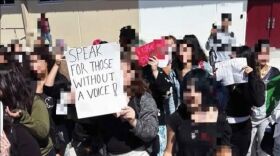Iran is dealing with one of the worst outbreaks of the coronavirus in the world, with a death toll surpassing 2,200 people. But getting help into the country is hindered both by a truculent Iranian leadership and strong U.S. sanctions.
On Sunday and Monday, two cargo planes chartered by Doctors Without Borders landed in Iran. On board was an emergency medical team, along with material to build a 50-bed inflatable treatment unit destined for Isfahan, the country's third-largest city. The international aid group, known by its French acronym MSF, had all the necessary documentation and says its team was initially welcomed by Iranian officials to help with the growing crisis.
On Tuesday, Iran's Ministry of Health revoked its approval, saying Isfahan did not need additional help. Michel Olivier Lacharité, who heads MSF's emergency response desk, says the aid organization was "very surprised" by the decision.
MSF is in talks with Iran's Ministry of Health about where additional beds could be used.
Lacharité says this is an emergency and MSF can't afford to wait weeks for an answer. "If there is no need, we are ready to go and to support any neighboring country or other location," he tells NPR.
There's little doubt that Iran needs help to combat the coronavirus crisis. Its health care system — and its economy — have been devastated by U.S. sanctions over the past two years. The country needs money for medicines, ventilators and food.
Even so, the Trump administration continues to add more sanctions. Secretary of State Mike Pompeo says Iran still finds money for military purposes and there are exemptions to the sanctions for medicine and humanitarian aid.
The administration has offered aid to Iran to battle the coronavirus — "We want that humanitarian, medical health-care assistance to get to the people of Iran," Pompeo said last week — but has been turned down.
Mara Karlin, a former Pentagon official now at the Johns Hopkins School of Advanced International Studies, says despite Pompeo's assurances about humanitarian exemptions from sanctions, many countries — and businesses — are wary of helping Iran. They fear they could also face sanctions by the Trump administration and be cut off from the U.S. financial system.
Copyright 2020 NPR. To see more, visit https://www.npr.org. 9(MDAyMTYyMTU5MDEyOTc4NzE4ODNmYWEwYQ004))





